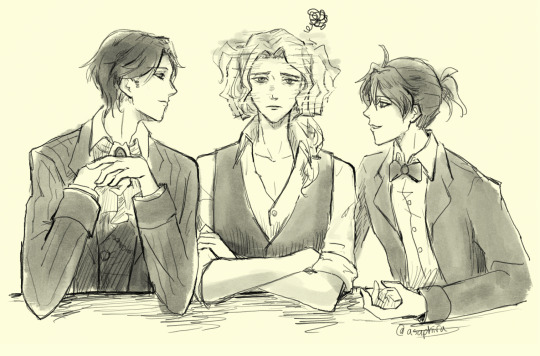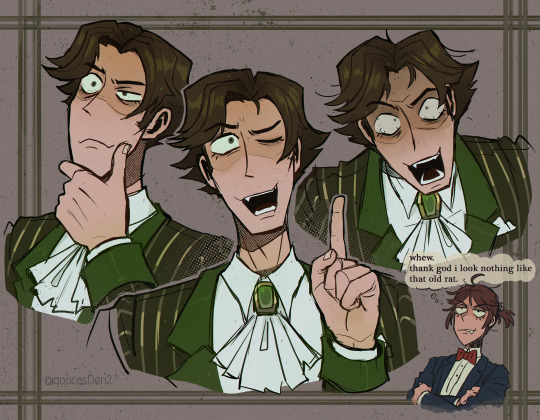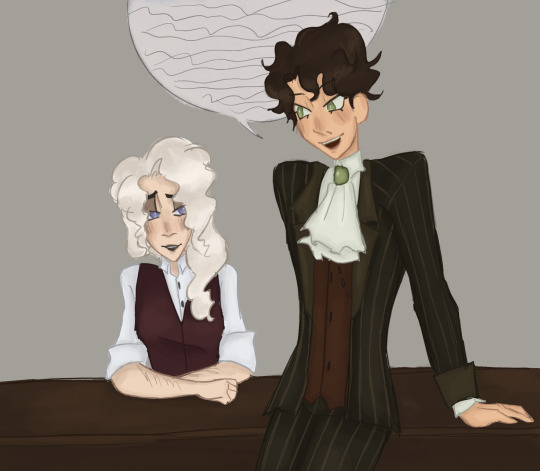#herman zeeman
Text



*just in case, tw: death for the second one
#my art#identity v#idv#identity v prisoner#identity v hermit#luca balsa#herman zeeman#alva lorenz#tw death
617 notes
·
View notes
Text

AU with a living Herman
Alive, but is that good?
#identity v#idv fanart#idv au#herman zeeman#herman balsa#alva lorenz#idv hermit#halva idv#art#fanart#sketch
68 notes
·
View notes
Text

some expression practices
#art#idv#idv art#idv fanart#identity v fanart#identity v#orpheus#orpheus deross#idv orpheus#the novelist#herman balsa#herman zeeman#idv herman#idv luca balsa#luca balsa#idv the prisoner#idv prisoner#idv embalmer#idv aesop#aesop carl
22 notes
·
View notes
Text

🥃⚡️⛓️ sandwich
#identity v#alva lorenz#luca balsa#herman zeeman#halva#lucaalva#idv hermit#idv prisoner#my art#idv fanart#this is a recent meme on twitter based off of a vintage illustration
20 notes
·
View notes
Photo



found some luca and his dada drawings. luca was done while i was testing procreate
162 notes
·
View notes
Text






Days 1-6 of my Alva week (Twitter) things :3 (last one with Luca isn’t ship art btw)
10 notes
·
View notes
Text

Lives my silly little life in a state of shipping delusional only shrimp can perceive
#identity v#idv#identity v hermit#identity v prospector#idv hermit#idv prospector#alva lorenz#norton campbell#herman zeeman#herman balsa#halvanort#identity 5#id5
16 notes
·
View notes
Text

Doodle of Herman, Alva and little Luca cuddling. Inspired by cuddling with my husband and our toddler!
34 notes
·
View notes
Text
•••DROWNED BY MEMORIES•••
Herman Balsa/Alva Lorenz
Fandom: Identity V
First published in AO3 on the date 2022-12-29
Alva holds a glass of water in his left hand, because the idea of doing this with his head atrophied by alcohol hurts him. In his right hand is a pencil, and on his desk are a couple of papers.
At first, when it was still afternoon, he had tried to continue developing the formula, solving for integrals and deriving others, seeking an approximate result for what he needed, but as the hours passed and his progress seemed too small, he embraced the night closing the notebook full of numbers, to then take possession of another, with a worn appearance like almost all his work-related belongings, what differentiated it was that this was not a work notebook, it was one full of letters that narrated Alva’s sadnesses...
It was a gloomy dinner, since his intake varied between ellipses and sad letters, devouring each of the sentences dedicated to a single name, that of the man who two years ago had hidden from the albino's eyes. He reread them until tears bled from his eyes, soaking the paper, which, resistant, was standing those torrential rains again. The crying was muffled when his throat was tired from sighing, and his eyes were too irritated to continue crying.
Alva never assumed the lies were true, it was no secret that he missed him; however, on those dates so far from the first day that Herman left, it was already rare for him to relive the old memories of a sweet romance. This of all the sleepless nights he had dedicated to his memory was special because now more than before he had reasons to suffer. There was a reason why he had just remembered his cheekbones again, his chin, the soft wood-colored hair that decorated his head, and those deep green eyes.
The morning headlines would not go unnoticed by the cultured men of science, who would fix their eyes on the announcement that a great scientist was visiting the city. That scientist was Herman Balsa. Although the news was discussed at breakfast that Alva had with his co-workers, he downplayed it or at least pretended not to give it relevance at the time. He wouldn't deny the shame he felt when he asked for him at the hotel where he was rumored to be staying, nor would he deny that he felt guilty when the rumors were confirmed, and he asked for the room's phone number. He had already broken every promise he made to himself when he decided that life would go on, even if it had to go on without him.
Returning to the present, we can see Alva tired, lying on the surface of the desk, with the pencil still between his fingers, after having tried to compose new verses to dedicate to the clash of emotions he was feeling. What was it? Disappointment? Happiness? Maybe just a horrible mess of multiple feelings mixed up in the worst way, an emotional Frankenstein monster in his being, struggling to get out, screaming, breaking everything down, and crying. Perhaps that was his reaction to all this because Herman never bothered to explain, the story was vast, but it was easily summed up in multiple missed calls, both from Alva and from other Zeeman acquaintances.
“Ha ha ha, Zeeman,” he thought aloud as he stared at the phone. “Did you get married, Herman?”, “In the headlines, it was clearly read that your last name is “Balsa”…” he muttered to the air as if he were really going to hear him.
He really had been willing to dial the number given by the receptionist, perhaps demand an explanation or just cry into the microphone of his cell phone while Herman awkwardly had no choice but to listen.
“ You don't know how happy it makes me settle for the fact that that last day with you was one before you left here, I can presume that your last moments before returning were not spent with anyone other than me. I can presume that the one who has the freshest memories of the appearance of your face, of your body, is me. I don't even care that I don't have someone to show it off to. Furthermore, I am the owner of the most wonderful memories that almost any being will be able to live by your side because I know as far as I can that I have loved you more than anyone could. Not only that, but I even fell in love with your defects, and I dare say that just thinking about each of those negative things about you, I still sigh, I'm afraid to say it, but I can't deny that to date I love those details of you, that in the eyes the rest would make you look mean.”
He paused, and sat up in the chair, his body, anesthetized for a while, brought the edge of the glass to the corner of his lips to drink water. A bitter drink, it really looked like water, although two glasses ago he had forgotten that it was mezcal, a good quiote distillate.
“Although you also don't know how miserable it makes me feel, just tell me, what am I, Herman? What the hell am I if not your slave? Poor idiot me, who still dedicates his best days to you, who can't move on and get a real life, because he's still chained to you and your selfish desires, leaving my life's work for your whims and aspirations… Still, what am I doing, trying to claim to you? If I was the one who condemned myself to such a miserable fate by deciding not to say goodbye to your memory…“ Looking into space, the well-kept words flowed out of him fluently, because after being stored for so long, what emotions most wanted was to get out of Alva and explode like grenades, bombarding the now nonexistent silence of the room.
“I swear to have dedicated myself before to delete you, when half a year passed and nobody knew anything, I decided that I had to continue, got rid of your number and some photos, but tell me, what made you believe that I would not miss you or that you would not hurt me? If I was so used to you, that when you left for God knows where, you removed a piece of me… I didn't get rid of all your photos, I didn't get rid of any of your belongings. I even continue with the tradition of spending Christmas with your family, they have not stopped inviting me, and your mother does not stop comparing me with the many ex-girlfriends of yours that she did not like, saying the good choice you had with me because even with your absence she appreciates me. ”
“Loneliness has played havoc with me because it has made me realize that the one I was closest to was you, even so at the end of the day we both seemed distanced from each other, I had never had such a strong bond, and from your words, what Now I don't know if they were true, I doubt you would have had such a close connection before… It's selfish for me to see things like this, but can I be blamed? My life has been so colorless since then, I would swear that the saturation of the colors that I see in my day to day has decreased since your absence marked my life, because no color makes sense if you are not there to appreciate it with me… Is it dependency? Everything I say sounds bad, it sounds very bad. It's not really like that, really, it's just a way my desperation is making it look like, I swear. I swear that I don't need you so much, that I don't depend on you as it seems that I do, even if I miss you, I always kept a certain degree of independence, it only hurts me that you were not here to share the news of my life and that I wasn't there to share the news of yours…”
One more drink and his throat released another sigh, it was dry thanks to the alcohol in his system. He dropped the pencil, a growing weakness beginning to creep up his legs into his arms, and finally his head, the tears growing and pooling in his eye sockets, falling as the liquid pooled, down, and pooled on his clothes. “You should have told me if you were bored, or if you needed to leave to progress academically… you should have told me, it's not like we don't care about you, your mother… I haven't seen her, but she must be as impressed as me, or even worse… you should call her and make her know you're okay… do you hear me? Herman, are you hearing me? “ The question filled a room empty except for Alva and the objects that surrounded him. “I hope you listen to me and my words reach you as much as the fact that you left reached us…”
“Going back to my initial question… Did you get married? Should I forget what we were? Please let me know about those things because I still hadn't gotten used to the idea of turning the page… it's a shame because I thought that in the book of my life I would be able to write a dedication to you at the end…”
But that characteristic sound of a telephone interrupted him.
Beep…
Beep…
Beep…
Herman had just hung up the phone.

#Halva#Hermalva#Herman Balsa#Alva Lorenz#identity v#identity v fanfic#angst#im sorry#im so gay#lentejas#fanfiction#fanfic#ao3 fanfic#ao3fic#Spotify#Drowned by memories#Herman Zeeman
2 notes
·
View notes
Text
it blows my mind more people give grace to herman fucking zeeman than rose quartz who has shown more growth, humanity, empathy, and endearment to her own family
#the man with no face who is hated by everyone for just reason before a series even starts#vs a woman who grew out of a bratty sheltered life and did what she could and thrilled for a family#herman is not complex#rsoe has more complexity in her pinkie than herman
19 notes
·
View notes
Text

⚡ He came to believe the formulae and theories could never deduce human emotions.
⛓ He lost everything when he immersed himself in Rashomon. Was it all worth it?
TLDR: the free prisoner and the imprisoned warden
context-> 4vs1 game based on dead by daylight = lore known through specific characters quests unlocking sentences describing their past in the form of a personal journal
in-lore context-> INCREDIBLY NEBULOUS STILL 5 YEARS AFTER=> overarching plot intertwining all the characters released in what are essentially death games in a manor playground for psychological manipulation and experimentations drugging participants and having them experience hallucinations (it's real), largely irrevelant right now to blorbos as their past is the point of contention (and used against them 😘), but the lore is MOSTLY lies and trickeries from the participants, which is, hard to swallow for people. evidently the interesting part
=> characters often inspired by historical figures of all sorts
=> tesla vs edison but the twist, is that neither are lying nor telling the truth, pure raw miscommunication from mentor and student, interplay of personalities, edison's scheming and tesla's earnestness, exhibiting traits of their counterpart inspiration
=> two men suffering from the same man's actions and carrying a legacy of violence and lies by omission through it

^ the pivotal event pre-"manor" v what they look like within the context of the Game/Manor post-accident

=> Alva Lorenz = Thomas Alva Edison + Hendrik Antoon Lorentz ( Lorentz Symmetry <-important) => Luca Balsa = inspired by Nikola Tesla ( now for...his father, Herman Balsa, intentionally inspired by Pieter Zeeman, with whom Lorentz shared a nobel prize in 1902 for the discovery and theoretical explanation of the Zeeman effect (<-important) )
actual backstory time . .. . .a story full of unsaid and lack of clarity
alva and herman used to work together on a perpetual motion machine, born from the sketches of herman's idealism, they used to study together and were paired together so that alva would be the "stoic" able to temper such especially when it came to dangerosity, unfortunately, that man disappeared with all the funds, on top of all his family's money, for years, continuing to pay the fee for alva to work without ever sending a letter, alva considered that man a friend despite not even knowing....he had a family he abandonned for the sake of this machine. his wife committing suicide from heartbreak, alva went against his process and deemed it too dangerous, applying safeguards, which was met with herman's ire and calling him a betrayer, the resulting....being an explosion in which herman died,
alva attempts to seal away the documents, but is coaxed into displaying the prototype at an exhibition, the exhibition has him feel the Presence of that man . . .. ..his very son himself standing in front of it, talking passionately, sending him a letter after the chance encounter passionately asking to work under his tutelage on the machine, wishing to be known as the same kind of prodigy inventor as alva is, Lorenz Jr. ,(which, instead of understanding it as inventors and their talented student, most people believe it to be father-son...)
an auction had taken place in the past where alva bought out herman's sketches after his death. you could largely interpret it as sealing away the damned machine, stopping anyone else from working on it
he let luca work on it.
this prodigy student then proceeded to go through all of alva's documents and upon finding his father's sketches, condemned him as a man who would steal and take the spotlight for himself alone, a scammer through-and-through (edison reference) to which, he confronted alva by i suppose. simply shoving him against a bookshelf and electrocuting him, starting a fire. what a good boy.
"i didn't get my answer, even as the current struck his brain."
he gets sent to prison evidently for the death of the famous inventor, apparently has to pay alva's widow a large sum of money (which i deem unclear because she was never mentionned before his actual death?) ALVA GETS RESSURECTED BY AN OBVIOUS SCHROEDINGER CAT CULT, HE BECOMES A PREACHER TO THIS FAITH OF "truth in darkness." meanwhile luca gets, SOMEHOW PARDONED FROM NEARLY HANGED, and is Invited to the manor to find the truth.....while having never stopped wishing to complete the perpetual motion machine.
NOW FOR MY INTERPRETATION I WILL MAKE IT QUICK
even in the story for costumes, it's about luca not letting alva speak himself, alva's issue is largely unwillingness to defend himself against lies. it's written explicitely in his diary, so he just lets luca, imagine, go against him, in this sort of, mentor wanting his student to prove himself and being reluctant to contradict out loud, alva gets fucked over every single. time. and he takes it.
guilt from both parties, shame from both parties, mentor x student,
the prisoner is the one free and the warden is the one imprisoned, that's explicitely their story put in the idea of costumes too, it's insane papli. it's insane.
despite all of this? alva is shown to be happy to find luca a christmas gift. whatever!. whatever.



13 notes
·
View notes
Text
been thinking a lot about alva lately. the whole balsa zeeman lorenz affair is funny as it is but alva being the opposite end of the swing there .. you have two generations of zeemanbalzacs who are fucking delusional and then you have alva on the other side of that who is Just As Delusional except said delusions are about being able to "save" herman and then luca. Which is so wonderful and then equally as wonderful that hermit is how alva exists now because it's like. that savior complex taken to the extreme. iirc the shared alva connection damage is described as the cult prioritizing empathy and shared burdens (too lazy to look up the specific in-game wording) but like. That in context of alva ruining his life and career for herman and then luca bc he was convinced that maybe if he tried harder [herman would have loved him back] he could save them. I DONT EVEN LIKE HALVA but its undeniable that alva is down horrific for that man. everything alva does only makes sense if he loves herman (to which herman couldnt give less of a fuck in return) its crazy. I really do hope that alva's letters focus more on the cult. Maybe not the first one because they do tend to backtrack to deductions for the first letter but i want more cult lore. I'm not mad that alva so far has been largely focused around pre-death lore because i think understanding alva is essential to understanding luca lore but i want to see more about the cult soooooo bad. i love characters that have that kind of selfish empathy to them. Let me take your burdens so I can save you because maybe then you will care about me the same way I care about you or whatever.
#if you already saw this on my cc sorry#bone analysis#idv#identity v#alva lorenz#idv alva#idv hermit#we should put this guy in a room with naib for no reason
9 notes
·
View notes
Text


what if...


I was inspired
#identity v#idv#idv fanart#art#fanart#alva lorenz#idv hermit#herman balsa#herman zeeman#Halva idv#I HAVE SUCH DEJA VU#Sketches
120 notes
·
View notes
Note
Do you have any thoughts on the Alva and Ann relationship or any conjecture on what will go on with the cat cult?
So my biggest thought on the Alva and Ann relationship thus far is that given the information we have in canon, Alva matters a lot more to Ann than Ann matters to Alva. I don’t mean that pejoratively, or that Ann matters less as a character, but that there’s an asymmetrical amount of information from each characters’ perspective.
From Alva’s perspective right now, we have a lot of information on Herman Zeeman, and a lot of information on Luca Balsa. We know that these two fundamentally altered who Alva became, and that together their actions indirectly and then directly delivered him to the cat cult (Herman by undercutting his trust in people—pushing him to withdraw more and become more hermit-like—and Luca more directly by killing him). We also have Luca in Alva’s first essence, which kind of hard sell’s their connection. We have nothing from Alva’s perspective about his time in the cult yet, or his feelings about it. The closest we have is the very end of his intro trailer and his website background story, both of which more or less end with his introduction to the cult and the spurning of the rest of society for it.
From Ann’s perspective, I think the cult is a lot more of a formative force in her character, owing to her seeming younger than Alva, us having more information related to her vs Alva, and honestly the cult just featuring way more prominently in her backstory. From everything we can tell right now, Alva recruited her father to the cat cult, which set her on her path, willingly or unwillingly. The cat cult is mentioned as part of her childhood in her deducs, and Alva is mentioned directly or indirectly in both her character day letters so far.
So to Ann, Alva is this major figure of her childhood, of her background, and part of ultimately where her future went. But to Alva, Ann is conspicuously absent. His most formative events, the things the narrative shows us, focus on the past and the Balsas. And that’s really interesting! To Ann, Alva is the man that changed the course of her family and her life. To Alva, as far as we can tell, Ann and her family were just some people he brought into his cult. I’m really hopeful when we get more info from Alva’s first letter that gives us some of his perspective on the cult and Ann, but I don’t hate the asymmetry right now, because it really is so telling for what both characters are hung up on.
As for what will go on with the cat cult… god I don’t know. I have things I *want* to know, like how they’re resurrecting people (is magic real?) and what the hell is up with the implications of ritual surgery in both Ann’s second character letter and on the cat’s model. I hope we find out how zealous Alva is, and I hope it’s exactly zero percent (I hope he’s so resigned to doing a cults dirty work, but the opposite would be interesting too!). I want to know if Ann and Alva are actually alive again, or if they’re drug fueled hallucinations of people that once existed in whatever game they get attached to. I want to know if the cult is associated with the person running the games, or if the game runner is just taking advantage of something batshit in the world already. I think right now though I prefer to keep my thoughts open, so I can enjoy whatever comes my way rather than get disappointed by what they don’t end up doing.
16 notes
·
View notes
Text
5 Special Relativity 12Aug17
The Swimmer in the Stream
This story illustrates a point that will become very important in the foundations of Special Relativity.
Imagine a broad river flowing gently and evenly at speed r and that there are two markers anchored in line with the flow and at a set distance L apart. A swimmer who swims at a constant speed s is going to swim from the upstream marker to the downstream marker and back again. How long will this take?
Let us denote the duration of the downstream lap by T1 and the duration of the upstream lap by T2. Swimming with the current the swimmer will have a combined speed of (s+r) and so T1 = L/(s+r). Swimming against the current the swimmer will have a net speed of (s-r) and so T2 = L/(s-r). Total time T1+ T2 = 2Ls / (s2 – r2) = g2 . 2L/s where g= √(1 – r2/s2) .
Now rearrange the two markers so that they lie directly across the stream but at the same distance L apart. If the swimmer does not allow for the current he will be swept downstream of his destination. He has to angle his swim upstream a bit. Using a bit of Pythagoras, the distance he will have to cover on each lap is L√(1 + r2 T) where T is the time it takes. His swimming speed is this distance divided by T. We can easily solve these two equations for T to discover that T = L / (s2 – r2 ) and so his total time is 2Ls/(s2 – r2 ) = 2L/s /√(1 – r2/s2) = g. 2L/s
In other words, the duration of the swim down and up the river flow is longer than the duration of the swim across and back the river flow by a factor of g = √(1 – r2/s2).
Let us have a look at the factor g. If the river flow is zero then g=1 so the swim takes the same duration of time in either direction, as you would expect. Also note that g is a positive dimensionless number that is always ≥1.
What does all this aquatic athleticism have to do with Special Relativity? Well it is relevant to a whole lot of experiments that were taking place towards the end of the 19th century in an effort to discover more about the nature of light. It had already been discovered that light travels at a huge but finite speed close to 300 million meters per second. It had also been discovered that light was essentially electro-magnetic in nature. (See Faraday effect, Kerr effect etc).
But scientist were asking themselves, if light is an electro-magnetic wave, what medium is it travelling in? The thinking was that there must be a type of invisible “lumiferous aether” enveloping everything and this provided the medium for the electromagnetic wave.
In 1886, Michelson and Morley set up a clever experiment to detect this aether. The apparatus was an interferometer designed to detect any effects of the earth’s movement through the aether field. It consisted of a beam splitter (half silvered mirror angled at 45 degrees to incoming light), plus two mirrors mounted on orthogonal arms exactly the same length as each other. The whole apparatus was mounted on a massive stone block floating in mercury in order to reduce vibrations and to allow everything to be rotated.
The experiment is very similar to our story of the swimmer in the stream. The observers have two carefully measured lengths set at right angles to each other, much like two axes in a reference frame, and the observers remain at rest in this frame. The role of our swimmers is taken by photons of light. The role of the stream is taken by the movement of the observers and their apparatus through the lumiferous aether. The speed at which this happens is the speed at which the Earth is moving through space as a result of its own rotation (460 m/sec at the equator) plus its orbit around the Sun (30,000 m/sec). Note that the speed of light is 10,000 times faster than the speed of the Earth’s orbit.
In principle, light travelling with the aether drift and then back again would take longer to complete such journey than light travelling across the aether wind and back again (simply because the light would lose more time a swimming against the tide on the way back than it gained getting on the way forward). Any travel time differences would show up as an interference pattern.
But try as they might, no such interference pattern could be generated, no matter which way the apparatus was oriented. Light travelling in one arm of the experiment always took the same amount of time to travel as light travelling in the other arm. No aether stream effects could be detected. The experiment became perhaps the most famous null experiment in physics. Albert Michelson received the Nobel Prize for physics in 1907.
The results of this experiment and others like it were very perplexing. Hendrik Lorentz, George Fitzgerald, Henri Poincaré and others worked hard to interpret what it all meant. What it meant was that the round trip duration of light over the two arms of the experiment was exactly the same, and since the two arms were designed to be exactly the same length as each other then the round trip speed of light must be the same in both arms.
Let us go back to our swimmer in the stream parable again. Michelson and Morley and the two orthogonal swimming courses are fixed in place. The aether stream is flowing from East to West. But the photons swimming the East-West course take the same time as the photons swimming the North-South course. How can this be?
Ultimately the experimenters were forced to make some hard decisions. Either the speed of light is an invariant for all inertial observers, with all sorts of consequences for the meaning of time, length speed and in fact all physical properties of Nature. Or maybe it is just that the length of the East-West course has shrunk by the factor of g.
The experimenters interpreted the results as proof that the aether theory was wrong. This may have been a little hasty. What they actually demonstrated was that our fundamental notions of length, time and speed had to be re-examined. Moving observers get different measurements from measurements made by stationary observers. Measurements are affected by how you take them. Everything becomes relative.
Hendrik Lorentz
Hendrik Antoon Lorentz was born in Arnhem Holland in 1853 and became Professor of Physics at Leiden University at the impressive age of 24. With George Fitzgerald, Oliver Lodge, Oliver Heaviside and Heinrich Hertz, Lorentz refined James Clerk Maxwell’s equations and theories of electromagnetism and established the electromagnetic nature of light. Lorentz and his former student Pieter Zeeman received the Nobel Prize for Physics in 1902. He became a major influencer to Albert Einstein.
Lorentz and friends struggled to understand it the results of the Michelson-Morley experiment. There should have been a factor of g between the travel times of light in the two arms of the Michelson Morley experiment, but there wasn’t.
There are about half a dozen potential reasons for the result. Maybe the east-west photons interfered with the north-south photons before detection. Maybe the north-south photons slowed down so that arrived at the same time as the east-west photons. Maybe the east-west photons sped up somehow.
The simplest answer was that there just isn’t any lumiferous aether. This view was championed by Einstein and Herman Minkowski. Einstein just accepted that the speed of light was the same in any inertial reference frame and it did not matter which way such an inertial frame was moving. He made this a starting postulate for his theory of Special Relativity.
However, Lorentz was never comfortable with abandoning the aether idea. He thought that perhaps the speed of the Earth’s movement affected electromagnetism in some way. In 1892 he proposed that moving bodies contracted in the direction of their motion by the factor of g. This at least explained the Michelson Morley result in a simple way. George Fitzgerald had suggested the same idea in a letter to the editor of Science in 1889. In 1899 and 1904 Lorentz added the concept of time dilation to his thinking as well.
Lorentz developed the equations for changing from one set of (inertial) coordinates to another. These equations are now known as Lorentz transformations. The factor g is usually a written as the Greek letter Gamma in lower case and is called the Lorentz factor. Lorentz’s work paved the way for Einstein’s approach and Einstein regarded Lorentz as his greatest influence.
Note that the idea by Fitzgerald and Lorentz that moving through the aether might cause lengths to contract by the factor g is not the same as the very similar idea that will turn up in Einstein’s Theory of Special Relativity. Lorentz was looking for a physical explanation for an experimental result and the contraction would apply in the reference frame of the observers moving with the apparatus. The Einstein version of events is that a contraction would exist, but only when measured in the reference frame of observers moving with respect to the whole experiment, and the answer would depend on such relative velocity and had nothing to do with any aether drift.
Special Relativity – (my attempt to explain its derivation)
At the start of the 20th century, Albert Einstein developed a remarkable description of physics and in doing so developed some remarkable insights. His approach is now called the Theory of Special Relativity. Special Relativity has a set of simple foundations:
Approach the concepts of length, time, speed and simultaneity very carefully.
Define events in terms of the usual 3 spatial dimensions, but add in time as well.
Make sure that time is well defined and coordinated (synchronized) throughout this reference frame.
Choose a convenient system of units e.g. meters and seconds.
Make sure the reference frame is inertial i.e. the laws of classical physics hold true in a conveniently simple way.
These five points just create clarity about definitions and measurements.
However, there are three key postulates as well:
Insist that the laws of classical physics and the outcome of experiments do not depend on the inertial reference frame that the observer happens to choose to describe them in.
Recognize “classical relativity”, i.e. if body A is moving at velocity V with respect to another body B, then body B is moving at velocity (–V) with respect to body A.
Postulate that the speed of light is always the same in any inertial reference frame, irrespective of how that frame is moving (providing it is not accelerating or rotating) or oriented.
Einstein did not speculate about why the speed of light is always the same - he simply took an axiomatic approach and assumed it to be invariant so that he could investigate the consequences.
It is a bit odd that his 1905 papers Einstein did not reference the work of Michelson and Morley, but is implausible that Einstein did not know of their experiments and ones similar.
Einstein did wonder about why some reference frames are inertial and others are not, and he attempted to deal with this in a later extension of Special Relativity that he called the Theory of General Relativity. But that is for another essay.
Special Relativity – time slows down
Consider a very simple clock constructed in the form of an evacuated tube in which a pulse of light travels from one end to the other in exactly one second. Every time this happens the clock ticks. It is a simple clock – no moving parts, no electric fields, no outside disturbances. It is an improbably long clock but that doesn’t matter. It is c meters long, where c is the distance that light travels in one second.
Now choose an inertial reference frame and arrange the clock with its base at (0,0,0,0) and its length aligned to the z axis and fix this reference clock in place. Now imagine that an identical clock with an identical orientation whizzes by at time t = 0, travelling in the x direction at a very high and constant velocity of v meters/second. We are going to describe this second clock using our reference frame as described, and using the postulates of Special Relativity.
In one second the moving clock is v meters to the right. In our reference frame the photons inside the moving clock are travelling up a sloping line. A ramp if you like, with slope equal to c/v. The sloped path is longer than the vertical path being followed by the photons in our reference (stationary clock). But all photons must travel at the speed c (Postulate #3). So the photons moving up the sloping path cannot yet have reached the top of their moving clock. When all the clocks in our reference frame have just ticked to indicate that 1 second has elapsed, the photons in the moving clock have not yet reached the top of their clock, and so that moving clock has not yet ticked.
If we describe the moving clock in our reference frame, we would have to conclude that it is running slow. It completes a fraction of one of its seconds in the time that our clocks complete one second.
Express this as t’ g = t where t’ is a time duration time in the moving clock and g is a number bigger than 1. A simple application of Pythagoras Rule shows that g = √(1 – v2/c2). This formula is called the Lorentz factor.
Time intervals are well defined in our reference frame. And we know exactly where the moving clock is in our reference frame at every tick of our reference clocks. So in 10 seconds (say), the moving clock will be 10v meters to the right. In fact we could position a camera at that point on our x axis and take a picture of both the moving clock and the local reference clock at the instance the moving clock whizzes by. Our clocks will show 10 seconds, but the picture will reveal the moving clock to show a lesser time,10/g.
This is not an illusion. It is a real result. For it not to occur the light in the moving clock would have had to speed up in terms of our reference system so that it could hit the top of its moving tube at the same time as our clocks do. But then we would have to say that some light in our reference frame is moving faster than some other light, which is contrary to experimental results and Postulate #3.
Alternatively the length of the moving clock could have shrunk down to meet its photon in one of our seconds. But over time this would result in the moving clock shrinking to nothing, which is not what is observed either.
It is hard to comprehend. It seems contrary to everyday experience. That is because it is contrary to everyday experience.
Our brains struggle to fit it into the patterns of what we already know. We look for an explanation in terms of things we already know about. Perhaps the movement of the clock affects its functioning somehow. A bit like running underwater is slower than running on land.
I’m afraid not. We can attach a second reference frame to the second clock so that both the clock and the new reference frame are moving together. In other words the second clock is now stationary and the clock that was previously considered to be stationary now has to be considered to be moving. If we describe the second clock in terms of this new reference frame it would be perfectly normal. One tick every second.
And if we attempt to describe our first set of clocks in terms of this new set of coordinates, then it is our first set of clocks that will be observed to be running slow. The thought experiment is symmetrical. See Postulates 1 and 2.
The outcome has been confirmed experimentally many times over. For example, we know that mesons decay at a certain rate in the laboratory and we can count the decay products. However, if a group of mesons originate in the sun, and come whizzing past at a great rate of knots, we find far fewer decay products. The mesons are no different and they are decaying just as fast per second of time in a clock moving with them. But their second is smaller than a second in our earthbound reference frame and so we detect fewer decay products in our detection meters.
The atomic clocks in satellites used for global positioning systems have to be very accurate in order to work. But since the satellites are moving with respect to the earth’s surface, their clocks need to be adjusted so that they keep pace with identical clocks here on earth. In fact they need to be adjusted for several relativistic effects. Time dilation due to relative velocity is just one of the adjustments required. Not even the largest one, which is gravitational time dilation (see General Relativity later on).
We have to let go of our concepts of time developed since we were infants. Time is nothing more than a sequence of events, as measured in a suitable reference frame. If you want a reference time you need some reference events.
We have multiple blows to our normal concepts of time (1) everything we see is in the past and not in the “now” because of the finite time duration it has taken for the light to reach us, and (2) we will observe time running slow on every fast moving system that we try to observe.
What is the Time?
The simple question “What is the time please?” shows how deeply the concept of an absolute time is ingrained into out consciousness. There are in fact two versions of this question. The first is a request to be told what is the agreed reference standard time for the local location i.e. what would a “correct” clock say if one were available. The second question could be a request about a time duration – as for example if a parent asks a time keeper at the school athletics carnival for the result of their child’s running race.
In science, and particularly in astronomy, we have to remember that time is an artificial man made construct. There is no absolute time. There is no absolute standard of time duration. All we can observe is the passage of events. If those events are regular, such as the vibrations of a quartz crystal in a watch, then they serve a useful purpose in measuring durations of other things as well – but only in the local inertial reference frame.
Special Relativity – lengths contract
Let us switch to a reference frame attached to the moving clock and describe some of the things that are happening from this perspective.
Note that an event in one reference frame is also the same event in the other reference frame, and vice versa. Same event, just from a different perspective and hence measured differently.
According to pPostulate #2, one of the things that we can observe from our moving reference frame is that the original system of clocks and rulers is travelling past at the same speed v but in the opposite direction. We measure that they move v meters (measured in our frame) in one second (measured in our frame) and they measure that we move v meters (measured in their frame) in one of their seconds (measured in their frame), but in the opposite direction.
But v = distance divided by time in both frames. We both agree v is the answer for our relative velocity, and also that c is the speed of light as measured in each of our reference frames. So v = d/t = d’/t’ i.e. measurements in both references systems give the same numerical answer for the relative speed v. (d and t are local distance and local time duration measurements respectively, and the dash indicates measurements in the ‘other’ reference system).
So d = t/t’ . d’
and since t = g t’ then d = gd’
In plain English, distance measurements between two events, measured in the other reference system, have to be scaled by g to give the same numerical value as the distance for the very same two events, but measured in our reference system.
In even plainer English, things which we know to be a certain length when they are at rest in our system turn out to have a different (shorter) length when they are moving in that dimension and are measured properly in our reference frame.
So, for example, even a meter ruler, which we know and expect to be a meter long when at rest in our reference frame, might turn out to measure 0.66 meters long when it is moving at half the speed of light (say) and has to be scaled up by 150% to give the same result as an identical reference meter ruler at rest in our laboratory. But an observer travelling with the moving meter ruler does not observe any variation in his ruler at all.
Lorentz Transformations
We can choose different reference frames for our perspective. They can be moving (and usually are anyway), but it is simpler if they are not accelerating or rotating. Depending on the choice of reference frame, simple system descriptions can become complicated, and complicated system descriptions can become simple. For example would you rather analyse a trapeze act from the circus ringside, or from a passing train? And if there is a dynamical system on the train, would you prefer to analyse and describe it from a position on the train itself, or from a random viewpoint on the ground outside the train somewhere?
However, if there is a huge difference in speed between one reference frame and another, then we have to use Lorentz transformations for all the data and all the equations.
Other Relativistic Effects
Einstein went on to consider all sorts of physical behaviours using his four dimensional approach, and axioms about relativity and the speed of light. He developed a complete reworking of classical physics based on his new approach. He preserved classical physics but specified it more exactly and precisely, thus explaining some new experimental results involving light and fast moving systems.
This created some new insights. Considerations of collisions as viewed from different reference frames led to the conclusion that the dynamic response of matter to force decreased when that matter was moving at very high speeds. In other words, it takes increasing amounts of force to generate the same amount of acceleration when the object is already moving at relativistic speeds.
The most famous insight was that energy and mass are intertwined as expressed by the equation E2 = p2c2 + m2c4 where p is the momentum of the moving object and m is its mass when it is at rest in the reference frame.
If the object is not moving the equation shortens to E = mc2.
If the object has no rest mass, the equation shortens to E = pv. Since a photon has no inertial rest mass, this equation applies. It is interpreted as saying that the energy in a photon is equivalent to a certain amount of momentum.
It is a common mistake to shorten Einstein’s equation to E = mc2 and then to apply this to photons. Photons are definitely never at rest. It is the first term on the right hand side that is relevant to photons, not the second, though the numerical result is the same.
Minkowski invented four dimensional diagrams to describe simple systems. He created a definition of separation called a metric s = √(x2 + y2 + z2 – c2t2 ). A Minkowski diagram is usually drawn as a three dimensional diagram with one physical dimension suppressed and replaced by the time dimension.
(Annoyingly, the time dimension in a spacetime 4 vector is sometimes put first and sometimes put last. There is also a confusing practice used by most authors in physics to switch away from using meters and seconds and decide to put c=1, with all time and length measurements rescaled accordingly. It is much tidier and shorter, but takes some getting used to.)
Special Relativity is a work of genius. The experimental basis and much of the hard work had already been done, but Einstein took it to a whole new level.
#Michelson-Morley experiment#Special Relativity#speed of light#Lorentz factor#relativistic length contraction#Michelson-Morley#SpecialRelativity#LorentzContraction#LorentzFactor#SpeedofLight
1 note
·
View note
Text

Alva day yayy
3 notes
·
View notes